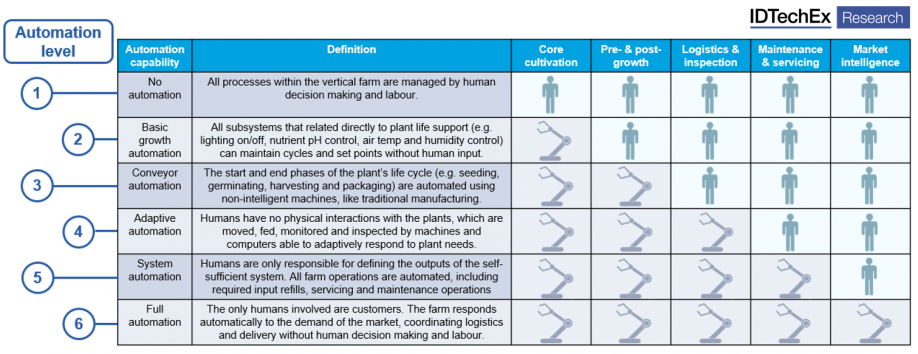Advancing Automation Technology Could Help Vertical Farms Achieve Profitability, Finds IDTechEx
IDTechEx has recently released “Vertical Farming 2022-2032”, a market research report exploring the technology and market factors of the vertical farming industry, which has attracted much attention from investors over recent years. The vertical farming industry raised over $1 billion in funding in 2021, a record high that exceeded the combined funding generated in 2018 and 2019.
Supporters of vertical farming claim it could revolutionize global food production, practically eliminating food miles by enabling crop growth right next to urban population centers. The traditional agriculture market is associated with a notoriously complex supply chain, with fruits and vegetables often traveling thousands of miles to reach consumers. Recent disruptions to supply chains caused by the pandemic and geopolitical issues have only served to highlight the flaws of this system. Vertical farming could help overcome these issues by disrupting the highly centralized model for fresh produce while capitalizing on the broader consumer trend towards local production. Additional drivers for the vertical farming industry, such as the effects of rising oil prices and diminishing arable land, along with an in-depth analysis of industry drivers by geography, are discussed in the IDTechEx report “Vertical Farming 2022-2032”.
However, the industry faces many challenges. Among these is a large amount of manual labor required; human intervention is required for many aspects of the farm, ranging from crop monitoring to system maintenance, and the labor requirements only increase with the sizes of the facilities. As many vertical farms are built-in environments not designed for growing crops, such as inside shipping containers, this can present operational challenges and require significant manpower. This results in higher running costs and thus contributes to the high prices commonly associated with vertically farmed produce.
IDTechEx has identified automation as a key technology area that could help vertical farms reduce these costs. By using extensive sensor networks for monitoring crops and growing systems, vertical farms can optimize their workflow by helping operators efficiently pinpoint problems. This would serve to reduce labor complexities and thus manpower required; additionally, this would also allow operators to direct their attention to tasks that would be difficult to automate, such as crop harvesting and maintenance operations.

Automation capabilities can be classified into six levels, with each subsequent level being more difficult to achieve than the last. Most farms today exist at level 2 automation. Source: IDTechEx, “Vertical Farming 2022-2032”
Industry leaders have taken notice of the value automated systems can bring, with several major vertical farms now looking to increase automation. Major player AeroFarms partnered with Nokia Bell Labs in 2021 to integrate automated crop monitoring with their vertical farm, while New York-based Bowery Farming have also made a move towards level 3 automation with a 2022 acquisition of robotic harvesting company Traptic.
While automation holds significant potential to drive vertical farming, it is by no means the only option for advancement of the industry. The IDTechEx report “Vertical Farming 2022-2032” identifies several other key technology areas that could lead to the success of the vertical farming industry, including soil-free growing methods, LEDs in artificial lighting platforms, environmental control systems, and sensors for environmental monitoring. The report also considers the economics of vertical farming in comparison to conventional agriculture and identifies opportunities for players in the industry and wider value chain. Based on interviews with 17 major players throughout the sector, including executives from 80 Acres, Crop One Holdings, and Jones Food Company, along with profiles of over 30 companies, this report draws insight into the state of the vertical farming industry.
Finally, the report includes 10-year market forecasts by business model and geography to understand the future of the vertical farming industry. Separate forecasts for vertically farmed produce within North America, Europe, Japan, China, and the rest of the world are provided, along with forecasts for container farms and other turnkey vertical farms.
To find out more about IDTechEx’s technical and commercial analysis of the diabetes management device industry, please see “Vertical Farming 2022-2032” (www.IDTechEx.com/VertFarm). This report falls within the Food and AgTech research portfolio, see www.IDTechEx.com/Research/AgTech for more.
About IDTechEx
IDTechEx guides your strategic business decisions through its Research, Subscription and Consultancy products, helping you profit from emerging technologies. For more information, contact research@IDTechEx.com or visit www.IDTechEx.com.
Comments (0)
This post does not have any comments. Be the first to leave a comment below.
Featured Product

